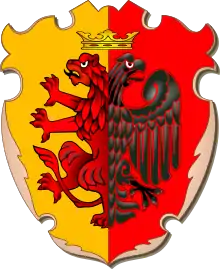Duchy of Sieradz
The Duchy of Sieradz (Latin: ducatus Siradiae, Polish: Księstwo Sieradzkie), also known as the Duchy of Siradia,[1] was one of the territories created during the period of the fragmentation of Poland. It was originally part of the central Seniorate Province, but became separated upon the death of High Duke Władysław III Spindleshanks in 1231, ruled by the rivaling Masovian branch of the Piast dynasty.
Duchy of Sieradz Duchy of Siradia | |||||||||
|---|---|---|---|---|---|---|---|---|---|
| 1231–1339 | |||||||||
 Coat of arms
| |||||||||
.png.webp) Poland 1275-1300, Sieradz marked in violet | |||||||||
| Status | Province of Poland Fiefdom of the Polish Crown (from 1306) | ||||||||
| Capital | Sieradz | ||||||||
| Religion | Roman Catholic | ||||||||
| Government | Duchy | ||||||||
| Historical era | Middle Ages | ||||||||
• Established | 1231 | ||||||||
• Ruled by Bohemia | 1299 | ||||||||
• Vassalized by the Polish Crown | 1305 | ||||||||
• Incorporated by Poland | 1339 | ||||||||
| |||||||||
In 1299 Duke Władysław I the Elbow-high had to cede Sieradz to King Wenceslaus II of Bohemia, who had also obtained the Seniorate Duchy of Kraków in 1291. Nevertheless, upon the extinction of the Bohemian Přemyslid dynasty in 1306, it was reunited with the Kingdom of Poland as a vassal duchy, and after 1339 incorporated by King Casimir III the Great into the Lands of the Polish Crown as Sieradz Voivodship. Around that time, the term Sieradz Land (terra Siradiensi, ziemia sieradzka) begun replacing the older Duchy nomenclature.
The importance of the territory is reflected in the Latin title of Polish kings: nec non terrarum Cracovie, Sandomirrie, Lancicie, Cuyavie, Syradziensis dux.
Dukes of Sieradz
- 1231–1233 Konrad I of Masovia
- 1233–1234 Boleslaus I of Masovia, son
- 1234–1247 Konrad I of Masovia, again
- 1247–1259 Casimir I of Kuyavia, son, younger brother of Boleslaus
- 1259–1260 Siemowit I of Masovia, younger brother of Casimir
- 1260–1261 Casimir I of Kuyavia, again
- 1261–1288 Leszek II the Black, son of Casimir, also Duke of Kraków from 1279
- 1288–1299 Władysław I the Elbow-high, younger half-brother, Duke of Kraków from 1306, King of Poland from 1320
- 1299–1305 King Wenceslaus II of Bohemia, Duke of Kraków from 1291, King of Poland from 1300
- 1305–1306 King Wenceslaus III of Bohemia, also King of Poland
- 1306–1327 Władysław I the Elbow-high, again, also Duke of Kraków from 1306, King of Poland from 1320
- 1327–1339 Przemysł of Inowrocław, son of Duke Ziemomysł of Kuyavia
References
- Rymut, Kazimierz (1987). Nazwy miast Polski. Vol. II, uzupełnione. Wrocław – Warszawa – Kraków – Gdańsk – Łódź: Zakład Narodowy im. Ossolińskich. p. 216. ISBN 8304024365.